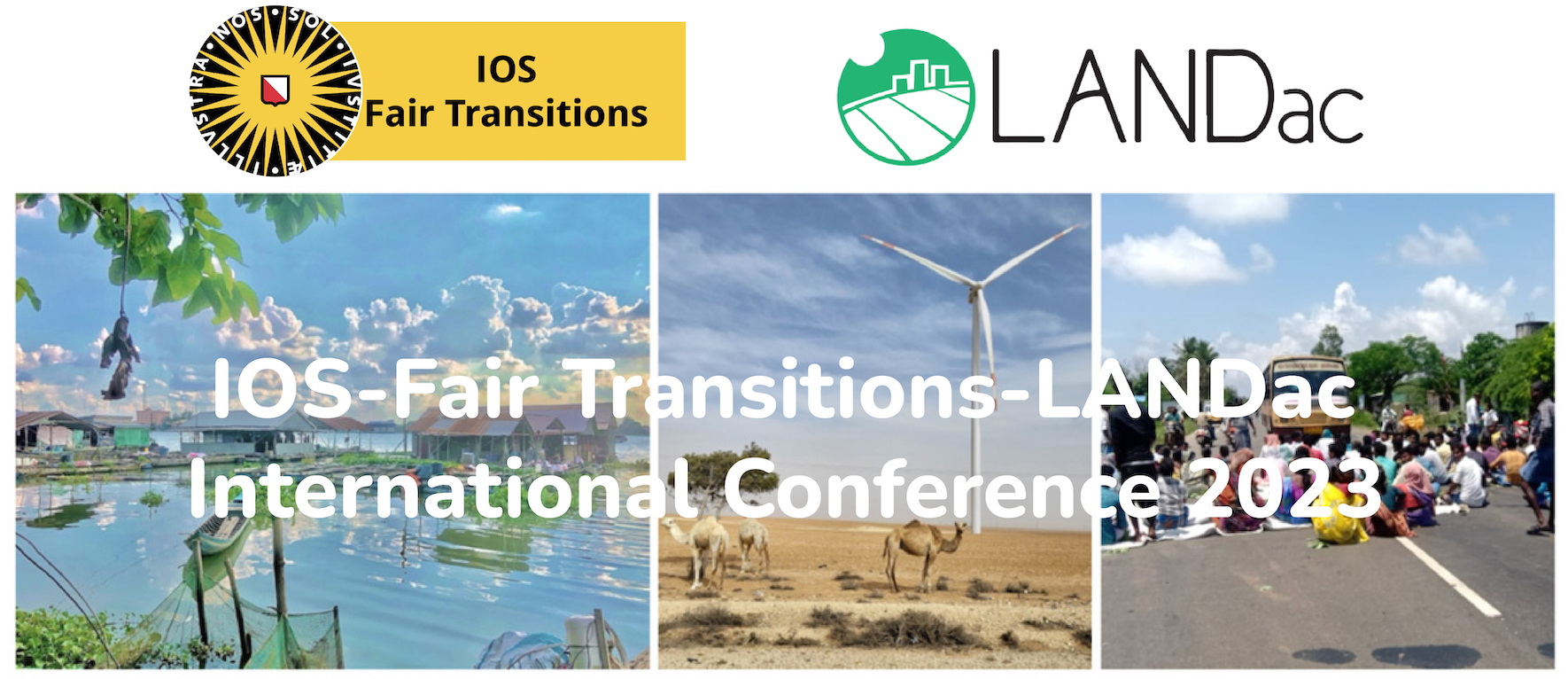IOS Fair Transitions / LANDac Conference 2023
Fair Transitions and the Politics of Land: Institutions and imaginaries for inclusive futures
This year, LANDac joins forces with IOS-Fair Transitions at the 2023 Annual Conference to discuss the intersection of debates on fair transitions and land governance in the context of climate change. The IOS-Fair Transitions-LANDac 2023 International Conference is structured around the common challenge of finding ways to make transitions fair and inclusive for human and non-human life. We look forward to an exciting transdisciplinary collaboration that we hope will draw many of you to Utrecht, the Netherlands. It will take place on June 28, 29 and 30 and will be an on-site event with a limited number of hybrid options.
Questions about how land is governed and controlled in the context of multiple crises are key to debates about fair transitions. The energy transition, net-zero ambitions, nature protection, and food system transformation all involve claims on land, water, and forests. How these claims are framed, analysed, and governed, how access to land is organised, and who gets a seat at the table to discuss key decisions are questions of urgent concern from both a fair transitions perspective and a land governance perspective.
More than ever, land is scarce and the transitions on the agenda take place in a context of high inequality at multiple scales and levels. Exclusionary pathways of transition lead to highly unfair distributions of ‘costs and benefits’ of the effects of climate change and mitigation measures. Under the current conditions of capitalism and authoritarianism, climate, food security, and biodiversity imperatives may lead to the loss of access to land and resources, and propel a deepening of existing social, economic, and political inequalities. Feminist, (post-)colonial and intersectional critiques from across the globe suggest ways to rethink these wicked problems and expose false solutions. The growing awareness that fair transitions in our times have to take into account non-human life in all of its articulations, asks for a serious change of perspective. Rethinking justice and inclusion from this perspective is hugely challenging- in land governance and beyond.
The current situation raises urgent questions as to how these transitions will and should be governed, and how dynamics of deepening exclusion and inequality should be addressed and prevented. The challenges ahead call for theoretical, historical, legal, and empirical analysis, feeding smart and sustained action. Key global concerns are: How much land do we need for what transitions? Who is able to claim what part, on what basis, and at whose expense? What (legal) frameworks should guide decision-making? With this background, the questions guiding this conference are: How could transitions be made fair for both human and non-human life? What role is there for land governance actors and (formal and informal) institutions? Who will have a seat at the table and what knowledges are taken into account? How will non-human interests be represented? Could transitions be a lever for promoting equity?
Keynote Speeches
Professor Mark Jackson
Wednesday, June 28th
Dr. Mark Jackson is a human geographer with an expertise in postcolonial, decolonial and posthuman geographies. His interests revolve around the ecologies of thought and action, knowledge ecologies, critical theory, urban life and political ecology.
Dr. Fatima Denton
Wednesday, June 28th
dr. Fatima Denton is the Director of United Nations University Institute for Natural Resources in Africa (UU-INRA) and holder of the Prince Claus chair. As chair holder dr. Denton has a goal to democratize the debate around just transitions by fighting for the inclusion of communities that are most affected.
Professor Christian Lund
Friday, June 30th
Lund is a Professor of Development, Resource Management, and Governance, at the Department of Food and Resource Economics, University of Copenhagen. His research focuses on property, local politics and state formation.
Conference format
The conference will be concentrated on-site, in Utrecht city centre. Limited options for hybrid sessions will be available. Keynote sessions will be live streamed.
Organising Committee:
Wytske Chamberlain (UU & LAND-at-scale)
Mayke Kaag (African Studies Centre Leiden)
Barbara Codispoti (Oxfam Novib)
Joanny Bélair (Bureau du Québec, Rabat)
Gemma van der Haar (WUR/LANDac)
Annelies Zoomers (UU)
Rick Dolphijn (UU, IOS Fair Transitions)
Imke Greven (RVO Netherlands)
Richard Pompoes (UU, IOS Fair Transitions)
Marit Meijer (UU, IOS Fair Transitions)
Summer School: Land Governance for Development
The conference takes place back-to-back with the LANDac/Utrecht University Summer School Land Governance for Development, which will take place 3-14 July 2023 in Utrecht. For more information and to register, please visit the Utrecht Summer School website. Summer School participants may join the conference free of cost.

